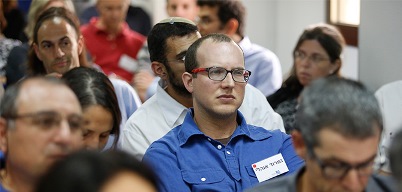On May 25, 2016, the Mandel Leadership Institute hosted a Mandel Platform event that explored the potential of informal education for addressing some of the most pressing social and educational issues in Israeli society, given the spread and growth of informal education networks in recent years. Entitled “Cracking the Code: The Power of Informal Education,” the event was led by fellows of the Mandel Program for Youth Leadership.
In his opening remarks,
Dr. Eli Gottlieb, director of the Mandel Leadership Institute and vice president of the Mandel Foundation–Israel, spoke about the importance of values: “What are our core values, the values that guide us in assessing whether what we do is good or bad? Informal education and the Israeli youth movements have much to offer in this respect.”
“The power of informal education is becoming more widely appreciated, as a way to reach young people and influence them,” said
Naftali Deri, secretary-general of the Council of Youth Movements in Israel. “Youth movements are now doing more than ever before, in terms of their areas of activity and numbers of participants. This comes after a decade of developments, including incorporating different populations, including children with disabilities, and absorbing immigrants.”
Miki Nevo, the director of the Youth Leadership program, presented the thinking and values that informed the decision to launch the Mandel Program for Youth Leadership: “From our perspective, the development of a common language and common consciousness is vital for the continued moral existence of the State of Israel. We need an agreed upon, binding system of social values, shared by all citizens of the state, to enable us to live together. This question, which touches on the physical and ethical existence of Israel, informs our approach to every other social issue. At the Mandel Leadership Institute, we are trying to contribute to this debate; in partnership with youth movements and with other leaders of values-based informal education, we are attempting to examine, understand, and define the movements’ unique role in Israeli society today.”
The opening session explored the role of informal education in dealing with social issues in Israel.
Yonit Jacobovitz, the director general of the Karev Program for Educational Involvement, presented her program’s activities and content. “Because the program is embedded into the formal education framework, it manages to reach areas that are otherwise inaccessible to informal education,” she said.
Professor Gad Yair of the Hebrew University of Jerusalem spoke about what he calls “Israeli pedagogy” – an informal pedagogy that is multi-dimensional, and that seeks to understand the “bigger picture.” According to Yair, the way scientific activity is conducted in Israel, and the way people are initiated into it, bear the hallmarks of informal pedagogy.

Following this session, the participants took part in break-out sessions on different contemporary issues facing informal education in general, and the youth movements in particular.
The Mandel Program for Youth Leadership provides a shared platform for exploring the various educational issues and challenges faced by Israel’s youth movements today, against the backdrop of Israel’s complex social and cultural realities. Participants in the program are senior leaders of Israeli youth movements, who influence the design of the movements’ educational worldviews and activities. Held at the Mandel Leadership Institute in Jerusalem over the course of one academic year, the program comprises lectures, workshops, case studies, field trips, and meetings with educational, social, and cultural figures. Subjects covered include: philosophical, sociological, and psychological aspects of education; social justice and social change; contemporary Jewish and Zionist identity; and challenges facing Israeli society.
Mandel Platform (Bimat Mandel) is a forum whose goal is to enrich the dialogue within the Mandel community and among the public at large through encounters with leading researchers, thinkers, policy makers, and practitioners.
